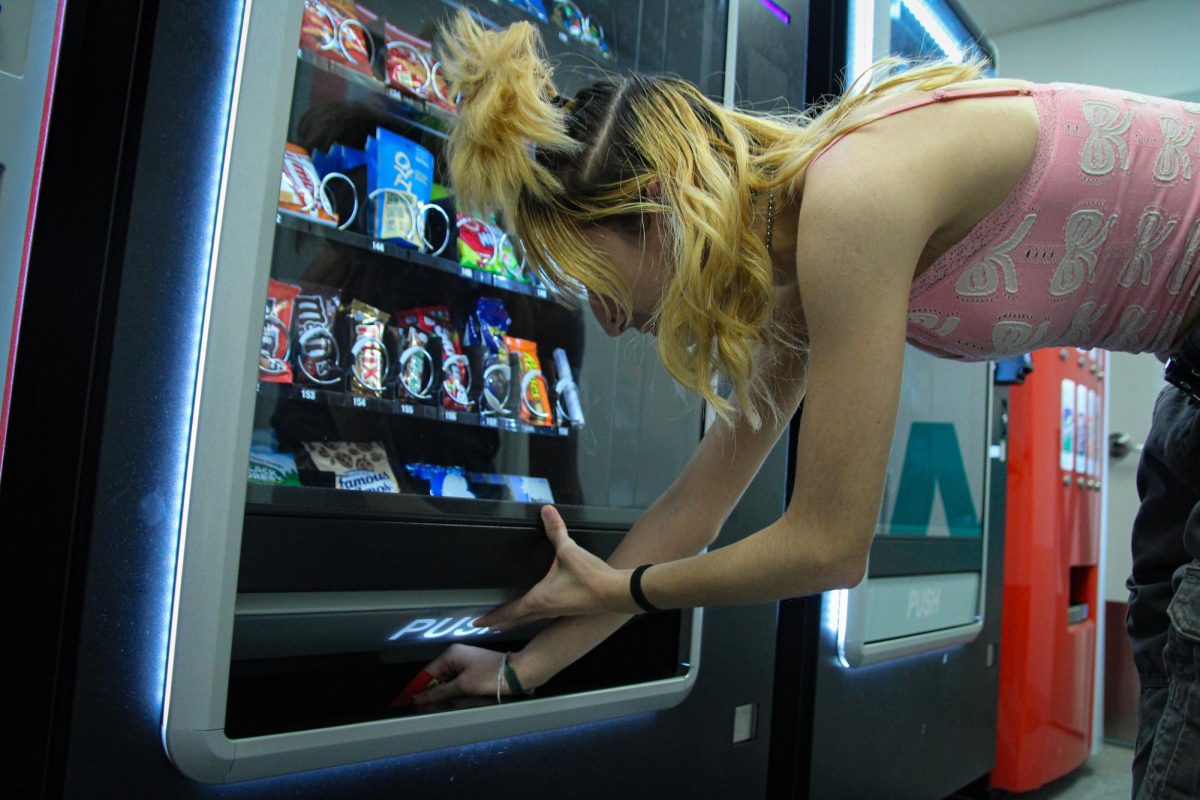The vending machines in five different campus buildings have contained expired items over the last year, the Chronicle found during an extensive review of 54 vending machines over three different semesters.
The Chronicle visited every vending machine on campus in the Fall 2023, Spring 2024 and Fall 2024 semesters and found at least one expired item in multiple campus buildings. In September 2023, the chocolate peanut butter flavored GFB bars and blueberry and coconut chocolate flavored RXBars in the vending machines on the 4th floor of the Student Center had expired.
That same semester, the Little Debbie Nutty Buddy wafers in the 33 E. Ida B. Wells, 600 S. Michigan Ave, 1104 S. Wabash Ave and 1600 S. State St. buildings were expired, as well as the Nabisco Veggie Toasted Chips in the 33 building. A Nature Valley’s Sweet & Salty bar sold at the vending machine in the 72 E. 11th St. building was expired.
In all cases, the food had expired a month or two earlier, and the expiration dates were all visible from outside the vending machine.
The Chronicle revisited every vending machine near the end of the Spring 2024 semester and found that the expired items had been replaced with new ones. The RXBars in the Student Center, for example, had been replaced with new ones that expired later that year.
The only expired item found in the Spring 2024 semester was a Little Debbie Nutty Buddy wafer pack on April 3 in the 1306 S. Michigan Ave. building.
The Chronicle went back to every vending machine at the end of October and first week of December 2024 during the fall semester and found more expired items.
The chocolate chip flavored RXBar sold on the seventh floor of 623 S. Wabash Ave. had expired, and a blueberry flavored RXBar sold in the 11th floor of 624 S. Michigan Ave had expired in September. At the same location, the chocolate sea salt flavored bar expired in November. A chocolate chip flavored bar expired in June.
All the vending machines contain a telemetry pack which informs the family-owned Mark Vend Co., a vending machine company based in suburban Northbrook, about daily sales and low quantity, said Bryon Gilstrap, Columbia’s director of Procurement and Administrative Services. “When the machine gets down to 60% it lets their reserve or restocking department know that they need to put that on the truck,” he said.
Mark Stein, president of Mark Vend Co., said employees are instructed to remove any expired items and restock.
“It’s disconcerting to me that there are any out-of-date products in the vending machines,” he said.
Gilstrap said that each vending machine has a sticker with information to contact Mark Vend Co. to report any problems.
The majority of the items sold in campus vending machines have not expired, but they also would not be considered healthy options. Many products have allergens such as nuts, milk, wheat and soy.
“We start out with the items we think are going to be popular and if we have any requests, we work hard to accommodate them rapidly,” Stein told the Chronicle in a telephone interview.
The drink vending machine on the fourth floor of the Student Center is the only vending machine on campus that sells Muscle Milk and Fairlife Core Power.
The reason for this is due to its proximity to the Fitness Center, Gilstrap said.
In 2017, the Chronicle reported the removal of the Farmer’s Fridge vending machine, which sold healthier options such as salads, yogurt and fruit cups. The machine was removed when the basement level of the 600 S. Michigan Ave building was being developed into a cafe at the time of the article. The basement level has since been closed.
“We’ve brought back Farmer’s Fridge two times and we can’t seem to get usage high enough to meet the minimum monthly commitment,” Gilstrap said.
Mariana Montes, a sophomore interior architecture major, said she had purchased from the Farmer’s Fridge vending machine in the Griffin Museum of Science and Industry and has interest in it being reintroduced to campus.
“They have a nice variety of everything,” said Montes.
Junior animation major Luke Depaolo said he’s familiar with the Farmer’s Fridge vending machine but said he “likes what is available due to the on-the-go” aspect.
While not related to diet, the vending machines also sell feminine products and face masks. A missing component is medicine such as Tylenol and Advil.
“I think the challenge for us is to get a mechanism so that we understand the price point that’s going to come in,” said Gilspread.
Students also have other options very close to campus like the CVS at 520 S. State St. and the Jewel-Osco store at 1224 S. Wabash Ave.
“We’re in a very urban area, and it’s just a matter of being outpriced by other retailers within close proximity of campus,” said Lambrini Lukidis, associate vice president of Strategic Communications and External Relations.
Frannie’s Cafe makes up the cafeteria in Columbia’s Student Center. Dietary meal options include: a veggie burger, fruit cup and salad, to name a few. A veggie burger costs $5.50 and an assorted fruit cup costs $3.50.
In the vending machines, a ClifBar costs $2.50, Snickers costs $3.50 and Vitamin Water costs $2.75.
According to the U.S. Department of Agriculture’s Food Price Outlook, the cost of buying food away from home is expected to rise at a higher percentage than food made at home in 2025. The Food Price Outlook tracks and forecasts the annual percentage change in food prices by averaging observed and forecast prices. Food-at-home prices are predicted to increase 1.6% and food-away-from-home prices are predicted to increase 3.1%.
That may make it even more challenging for students to make healthy food choices.
TB The ColumbiaCares fund is available for students facing financial crises and also provides food packages for those struggling with food insecurity. The Little Food Library on the third floor of 623 S. Wabash Ave. provides snack items received from donations.
Montes said that she had purchased items from the cafeteria as she found them cheaper compared to buying them from nearby restaurants.
“I get it at your convenience, and you’re on campus, and it’s kind of only for the students here,” said Montes.
Students who live in residency have access to meals through the cafeteria in the University Center, which is included in Columbia’s on-campus meal plan.
Jamarkus Klein, a first-year business marketing major, said that he purchases food such as burgers in addition to protein meals and drinks.
“I go to the University Center and eat mostly dinner because I have some stuff for breakfast,” said Klein.
Gilspread said that traditionally, students would give input through notes, emails and contacting Student Affairs.
Montes said that even though she would like for there to be better food options on campus, “it’s also nice having the current options as well.”
Lukidis said that student feedback helps in “influencing the product type and vendor Columbia works with.”
Damian Lopez, a sophomore music major, usually buys snacks from the vending machines, such as Cheez-Its, as a quick snack in between classes but eats around campus sometimes.
Depaolo said he tends to buy Vitamin Water, beef jerky and occasionally Pop-Tarts.
“A great pre-workout snack is a Rice Krispies bar as it’s good to eat carbs and sometimes I’ll have that with a banana,” said Antonio Canela, a sophomore film major who regularly goes to the gym.
Michelle Rodgers, a registered and licensed dietician and health coach, said that it’s important to maintain protein as it helps with focus. Fiber from fruits and veggies helps regulate blood sugar.
“Avocado, nuts, seeds and olive oil add satisfying fats that can help with focus and prevent energy crashes,” Rodgers said. ”Most people’s diets are low in protein and higher in carbohydrates and sugar so a snack with additional protein is a great option.”
Copy edited by Trinity Balboa
















